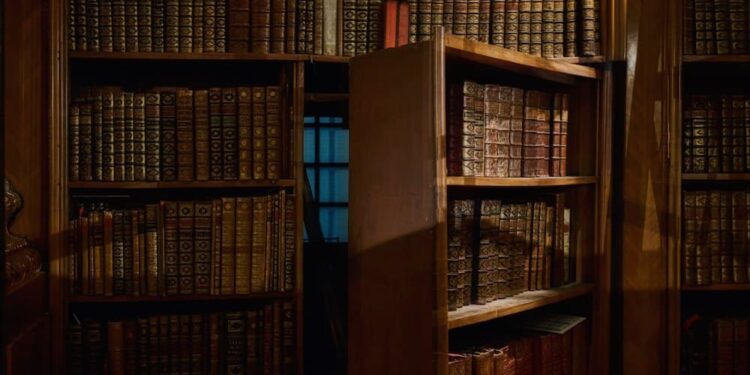
If you’ve not heard of Corrigan’s Secret Door, you’re in for a surprise. The term carries the name of Dr Dominic John Corrigan, a prominent, successful, and very busy Irish physician and politician of the 19th century. It denotes a metaphorical escape route for busy physicians from their hectic clinics.
I hope the original Dr Corrigan won’t mind his name being used honorably by a former physician starting up an anonymous doctors-for-doctors support platform.
We may think that it is only modern medicine that overwhelms us, but doctors have always been busy. Sir James Paget, for example, would regularly see over 60 patients each day, sometimes traveling many miles on his horse, to their bedsides.
If Corrigan’s secret door actually existed (see below), he was onto something long before physician burnout was a thing. Of course, he was a believer in studiousness and hard work: “There is but one road to excellence and success in our profession, and that is by steady, sturdy and hard labor”.
But he also had his escape route. Here at Physicians Anonymous, we argue that it is important for physicians to have a safe space where they can relax, share freely, and in confidence. We created Physicians Anonymous as a form of Corrigan’s secret door – to create a virtual safe haven for us to tackle physician burnout together.
There is but one road to excellence and success in our profession, and that is by steady, sturdy and hard labor" - Dominic John Corrigan.
Corrigan was born 1 December 1802 in Dublin, the son of a hardware shopkeeper. He studied medicine in Dublin and Edinburgh, where he received his doctorate in 1825. Corrigan returned to Dublin to open his own practice and become a lecturer of medicine. Even though he had only six beds at his disposal, there he conducted a series of pioneering experiments on heart disease.
Corrigan’s name is particularly associated with clinical findings in aortic regurgitation (AR) and the eponym is still widely used, together with many others. The quality of the peripheral pulse in AR is often referred to as Corrigan’s water hammer pulse. (A water hammer is a Victorian toy consisting of a glass tube filled partly with water in a vacuum. The water produced a slapping impact when the glass tube was turned over). He is also credited with Corrigan’s sign, disease, respiration, and cirrhosis. Not bad for a guy with an apparent escape route when things got too much.
Corrigan later became a Member of Parliament (MP) and his self-sacrificing devotion during the years of famine in Ireland made him famous even beyond the boundaries of medicine. Corrigan was named a baronet in 1866. He was defeated as an MP in 1874, apparently because he had supported the Sunday Closing Bill and thus antagonized the breweries. He died in 1880 and was buried in St Andrew’s Church in Dublin.
Many physicians, particularly those of the British-trained variety, will be familiar with this metaphorical description. It is mentioned in the first couple of pages of the widely used Oxford Handbook of Medicine. According to this description, Sir Dominic Corrigan was so busy 150 years ago that he had to have a secret door made in his consulting room so that he could escape from the ever-growing queue of eager patients.
Sir Dominic Corrigan was so busy 150 years ago that he had to have a secret door made in his consulting room so that he could escape from the ever-growing queue of eager patients.
The Oxford Handbook authors then propose that all of us physicians need a metaphorical secret door to escape into a calm inner world.
Whether or not this story is true is uncertain according to historians. Moreover, while Corrigan’s secret door is also first mentioned in a large textbook on medical eponyms, the secret door is not mentioned in a comprehensive biography on Corrigan and his biographer doubts that the secret door ever existed.
I often think about the underlying meaning of his escape route. I wish that I had found (or made) a similar one earlier in my career. Before the crash.
I also like to imagine what his secret door led to … some sort of smoking room with a warm fire, some good books, and a snifter or two of quality Irish whiskey.
Or maybe it led into his garden where he got to spend 20 minutes playing with his kids, chatting to his wife, or getting happily down and dirty in his garden.
Perhaps it was the joy of playing the cello, so beautifully described by Dr Alexander Woywodt in his piece, which inspired this one.
Whatever kept him sane in a world where, even then, demand for medical care always outstripped supply.
Imagine all physicians had access to a secret door... A secret door that allows us to share in safety and anonymity.
Imagine all physicians had access to a secret door. This door led to a room full of colleagues just like you, whose secret doors all joined up there.
Colleagues who would talk, listen, laugh and cry together. A secret door that allows us to share in safety and anonymity.
And walk out, back to our busy lives, refreshed and strengthened by the peer support and understanding that only one doctor can give to another.
Doctors supporting doctors is our way.
Where would your secret door lead? Let us know in the comments below!
If you would like to find out more, feel free to access our physician-only and anonymous peer-support groups. Come on in!
For more info on the original Dr Corrigan, the Royal College of Physicians of Ireland has collected some of his papers, which are available here.
